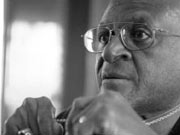WHO WANTS TO criticize Archbishop Desmond Tutu? Worshipped as a hero, the 70-year-old South African Nobel laureate has had a long and worthy career, first fighting apartheid and then attempting to heal its scars as head of the Truth and Reconciliation Commission. After he was treated for prostate cancer a few years ago, he said he was ready to step out of the public spotlight. God knows, he’s earned the rest.
Still, as Tutu put himself back in the spotlight last week during a Seattle visit that turned into a media blitz, I couldn’t escape a feeling of disappointment, especially given why he was here. Tutu was drumming up support for a new foundation—based, interestingly, in Seattle—that aims to promote “peace, reconciliation, and restorative justice” by training leaders according to lessons learned from South Africa. Headed by his good friend in town, St. Mark’s Cathedral dean Robert Taylor, the foundation hopes to offer leadership-training curriculum throughout this country and abroad as well as to generate income for a “peace center” in Cape Town.
His timing couldn’t be better. The world’s conflicts, once viewed by Americans as fodder for polite social chatter, are now felt in our bones, something that can and has killed our closest friends and loved ones. Like Northern Ireland, South Africa is, as Tutu repeated over the week, “a beacon of hope” for ending strife that seemed intractable. Its experiences raise relevant questions about both the War on Terrorism and the frenzied violence in the Middle East: Should you negotiate with terrorists? How do you get two communities to forgive seemingly unforgivable acts? Would the kind of amnesty South Africa offered for political crimes be appropriate in the Middle East or Afghanistan? What about a Truth and Reconciliation Commission in those places?
Hoping for some answers, I went to see the archbishop speak at a Rotary lunch last Wednesday. The media fanfare was winding down after a week of activities including his acceptance of an unusual honorary doctorate from the University of Washington. In the Middle East, things were heating up yet again. The morning’s papers brought news of two more suicide bombings in Israel after a three-week lull, one killing 15 at a teen hangout.
Before a roomful of dark-suited Rotarians at downtown’s West Coast Grand Hotel, Tutu took to the podium full of sprightly charm. He told a joke about a Presbyterian pastor whose husband had left her. (Punch line: “It could be worse. He could come back.”) He thanked a lot of people, his lyrical accent conveying an added eloquence, and then dipped into South African history.
“It did in fact seem that our country was going to be overwhelmed by the most awful, awful catastrophe and racial bloodbath,” he said. “When you had massacres happening as a matter of course; people being mowed down as they traveled on trains and busses.
“Then April 27 comes round, 1994 [the date of South Africa’s first democratic election]. . . . And the miracle happened.”
Exactly how was left to the imagination. Tutu was even more cryptic in addressing the Middle East crisis. He didn’t mention the previous day’s attacks, saying only: “We ought to be saying to Sharon and Arafat: Peace is possible.” About the War on Terrorism, he said nothing.
It wasn’t much to sink one’s teeth into. Consequently, when the Rotarians were subsequently given seven minutes to discuss Tutu’s “philosophy” among themselves, at least one table was stumped. Those assembled looked painfully at their plates until one businessman made a valiant but vague attempt to talk about his company’s ethics policy.
At a Boston conference last month, Tutu gave a more opinionated take on the Middle East, comparing Israel’s policies to apartheid. “I have seen the humiliation of the Palestinians at checkpoints and roadblocks, suffering like us when young white police officers prevented us from moving about,” he was quoted as saying by the South African Broadcasting Corporation. “Have our Jewish sisters and brothers forgotten their humiliation?”
That’s a controversial stand, of course, and it evidently wasn’t in sync with his mission to launch a foundation here, which will require much fund-raising.
In an interview after the Rotary lunch, the foundation’s board of directors, including Taylor and Seattle’s former first lady Constance Rice, made clear that they’re just getting around to thinking about the substance behind the foundation. Here’s hoping it will go beyond Tutu’s feel-good visit to delve into the messy complexities that it takes to actually achieve peace.









